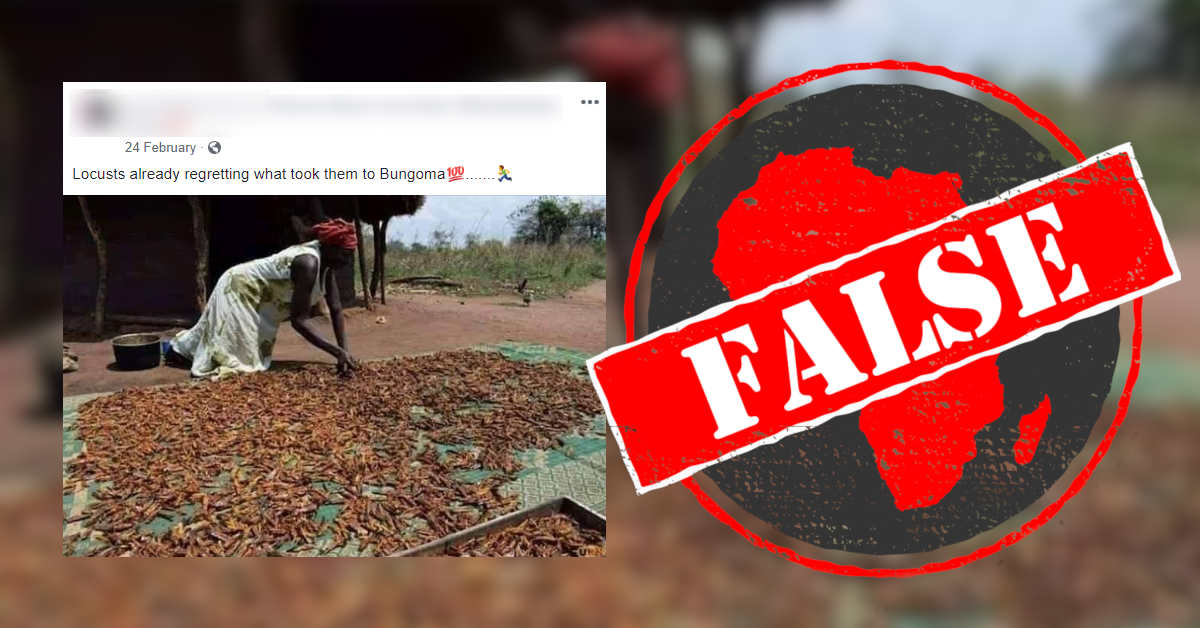A Kenyan Facebook user shared a photo of a woman picking through what looks like locusts spread out on a mat in the sun.
The caption to the 24 February 2020 post suggested that locusts in Bungoma county in western Kenya were being eaten by locals. It reads: “Locusts already regretting what took them to Bungoma.”
Another user who shared the photo captioned it: “Locusts are now regretting what made them land in Western Kenya. Posho mill owners in the region are reaping big since the migratory desert locusts landed in the area.”
Desert locusts have invaded East African countries in early 2020. The United Nations Food and Agriculture Organization, or FAO, has called the swarms “extremely alarming”.
But does this photo show a woman in Bungoma processing the insects as food? We checked.

A reverse image search traces the photo to an article in the Daily Monitor, a Ugandan newspaper.
According to the 20 February article, the photo shows 60-year-old Kutansia Anena. She was preparing and boiling locusts to eat them, at her home in Gogo village in Kitgum district, northern Uganda.
Like other residents in the region, Anena reported that she was being forced to catch and eat locusts for the second year in a row because of food shortages.
Residents in Bungoma, Kenya, were warned not to eat the swarming locusts, as they may have been sprayed with poisons in other regions.
Still, the FAO includes recipes for preparing and eating the desert locust in their frequently asked questions on the pest. – Dancan Bwire
The caption to the 24 February 2020 post suggested that locusts in Bungoma county in western Kenya were being eaten by locals. It reads: “Locusts already regretting what took them to Bungoma.”
Another user who shared the photo captioned it: “Locusts are now regretting what made them land in Western Kenya. Posho mill owners in the region are reaping big since the migratory desert locusts landed in the area.”
Desert locusts have invaded East African countries in early 2020. The United Nations Food and Agriculture Organization, or FAO, has called the swarms “extremely alarming”.
But does this photo show a woman in Bungoma processing the insects as food? We checked.

Photo from Uganda, not Kenya
A reverse image search traces the photo to an article in the Daily Monitor, a Ugandan newspaper.
According to the 20 February article, the photo shows 60-year-old Kutansia Anena. She was preparing and boiling locusts to eat them, at her home in Gogo village in Kitgum district, northern Uganda.
Like other residents in the region, Anena reported that she was being forced to catch and eat locusts for the second year in a row because of food shortages.
Residents in Bungoma, Kenya, were warned not to eat the swarming locusts, as they may have been sprayed with poisons in other regions.
Still, the FAO includes recipes for preparing and eating the desert locust in their frequently asked questions on the pest. – Dancan Bwire
Republish our content for free
For publishers: what to do if your post is rated false
A fact-checker has rated your Facebook or Instagram post as “false”, “altered”, “partly false” or “missing context”. This could have serious consequences. What do you do?
Click on our guide for the steps you should follow.
Publishers guideAfrica Check teams up with Facebook
Africa Check is a partner in Meta's third-party fact-checking programme to help stop the spread of false information on social media.
The content we rate as “false” will be downgraded on Facebook and Instagram. This means fewer people will see it.
You can also help identify false information on Facebook. This guide explains how.


Add new comment